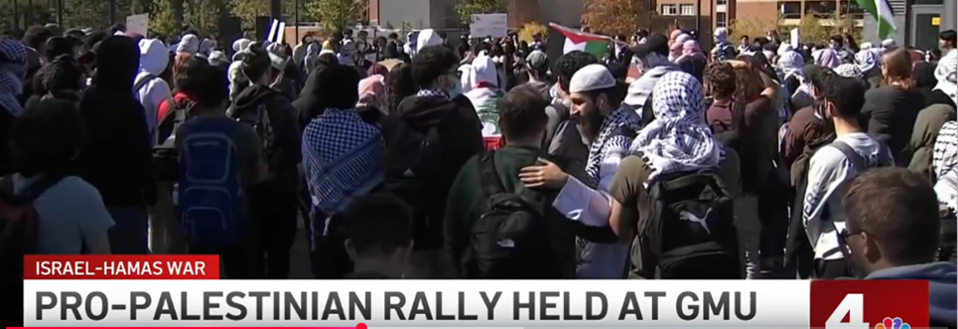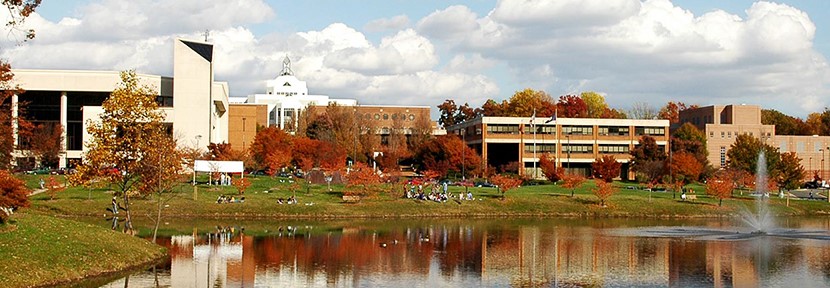Does George Mason University Have an Anti-Semitism Problem?
Barry A. Klinger, July 2025
1. Introduction
George Mason University has been accused of "silence on genocidal SJP rally", "DEI Ignorance - or Antisemitism,", and failure "to address campus anti-Semitism", and is being investigated by the federal government. As a Mason faculty member, I am concerned by any failure of the institution to properly address anti-Semitism on campus. I am also concerned by attempts to paint a false narrative to denigrate the institution.
I myself am Jewish and have personally encountered zero instances of anti-Semitism on campus, but my experience may not be representative. Therefore I have reviewed public sources to better understand threats to Jews at George Mason University and how the administration of the school's President Gregory Washington has responded to them since Fall 2023. Here I summarize my findings.
I am happy to receive responses, correction, or additions to what I have written or to my sources. I can be reached at my campus email address, bklinger@gmu.edu. For a quick summary of this summary, skip down to bottom of page.
2. George Mason University During the Israel-Hamas War

Public accusations against Mason have centered on responses to the war that began on 7 October 2023, when the Palestinian Islamic Resistance Movement (Hamas), based in the Gaza Strip, launched an attack on Israel and Israel retaliated. This war is only the latest outbreak of violence in the bitter conflict between Israel and the Palestinians that dates back to before the 1948 founding of the State of Israel.
George Mason University has experienced very little of the unrest that has riled other campuses. No buildings were occupied. No classes were blocked. No encampments sprung up on campus. The school, which has about 40,000 students in all, remained peaceful.
On 12 October 2023, the Mason chapter of Students for Justice in Palestine (SJP), a recognized student organization, held a pro-Palestinian protest in Wilkins Plaza in the center of campus. In local television news coverage, it appeared to be a peaceful rally of about 100 people. Smaller protests occurred later, including one in August 2024 which left behind graffiti calling for a "student intifada" and a protest that September against defense contractors recruiting on campus. A protest kicking off a "Week of Rage" in October 2024 seemed to attract a couple dozen people.
Mason administration reported in February 2024 that campus police broke up a fight involving three people at a rally; police brought charges against two of the three participants who were identified as instigators. A person caught distributing antisemitic flyers on campus in November 2023 was barred from campus for four years. A Jewish student was assaulted by a non-Mason student at an off-campus party. These three incidents are all recounted in Mason's response to the 2023 federal investigation. A social media post in October 2023 showed an anonymous woman in the Johnson Center tearing down posters that expressed support for Israeli hostages taken by Hamas. The post asked readers to "help us ID her!" Mason administration launched an investigation into both the vandal and what they described as "doxing" in the social media post. I have not found any conclusion to the investigation.
Police were involved in two off-campus cases involving Mason students. In November 2024, a dozen police from George Mason and Fairfax County raided the home of Jena and Noor Chanaa, two sisters who led the Mason SJP. The raid was related to the "spray-paint vandalism incident at George Mason in August." SJP faculty advisor Ben Masnski said the raid resulted in "no allegations and no charges that I'm aware of" against the sisters. However, police found legally owned weapons belonging to the women's brother (also a recent Mason graduate) and father. According to Fairfax County officials, police found Hamas and Hezbollah flags and arm patches with Arabic writing calling for death to Jews and America, though the family's lawyer disputes the translation.
After the raid, Mason banned the two sisters from campus for four years. Organizations representing faculty and other groups protested the ban on the grounds that it was based on political targetting and instituted without due process.
Just a few weeks later, in an unrelated case, police arrested a George Mason freshman, an Egyptian national named Abdullah Ezzeldin Taha Mohammed. The student was accused of plotting a mass casualty attack on the Israeli Consulate in New York. The day after the arrest, Mason banned the student from campus.
3. President Washington's Actions to Protect the University Community

Hillel is a leading Jewish organization active on many campuses to "enrich the lives of Jewish students". In January 2025, the George Mason chapter of Hillel issued a joint statement with the Jewish Community Relations Council of Greater Washington, which said, "steps taken by GMU administrators ... exemplify strong leadership and demonstrate much-needed commitment to and compassion for Jewish members of their community. ... We appreciate GMU President Gregory Washington and Vice President of University Life Rose Pascarell in particular..."
Within days of the 7 October Hamas attack, President Washington sent a message to the Mason community to condemn "craven acts of terrorism as we have seen in Israel," also noting that "Condemnation of these horrific acts of violence should not be confused with the need to address issues of freedom and democratic self determination." The message also outlined ways in which the university could support students affected by the conflict.
In a message on 2 November 2023, President Washington wrote:
"This is a fraught moment ..., with increased acts of violence and hostility toward members of the Jewish and Muslim communities. In particular, hateful expressions against the Jewish community are on the rise right on our own campus, including a very recent attempt to leaflet the Fairfax campus with deeply offensive antisemitic rhetoric. This disgusting behavior ... is fundamentally at odds with who we are as a university community. We repudiate antisemitism just as we repudiated the terrorist attacks on Israel last month. While we must acknowledge others' right to express themselves as they have, we as a community also claim our right to call out such expressions as ignorant and hateful, and with no place at George Mason University."
Washington and other administrators say they met with Jewish students, Palestinian and Muslim students, and others to hear their concerns and express support. The administration surveyed students and disseminated results to staff, and proactively reached out to students to make sure they got support whether or not they filed a formal complaint.
4. The Critique of George Mason and Anti-Semitism

In December, 2023, The Department of Education's Office of Civil Rights (OCR) opened an investigation into a complaint alleging that the University "discriminated against students" of Jewish ancestry "by failing to respond appropriately to incidents of harassment in October and November 2023." The OCR noted:
"opening an investigation in no way implies
that OCR has made a determination
on the merits of the complaint."
As far as I know, this investigation was never concluded, but in 2025 the same office opened a similar one into the school, extending the time frame of events to be investigated from 2023 to the 2024-2025 school year.
Public documents do not specify what incidents or procedures the complaints were referring to. However, all of the discussion in the media centers on one aspect of the issue: George Mason's response to objectionable statements and practices of political protesters on campus:
- The Washington Examiner ran a column suggesting that it might be anti-Semitic for Mason to accuse a social media account of trying to dox the woman who pulled down a poster in the Johnson Center.
- George Mason law professor David E. Bernstein and 16 colleagues faulted President Washington for not explicitly condemning statements SJP made at their October 2023 rally.
- Ian Kingsbury of the Educational Freedom Institute called for removing President Washington for (in part) "his refusal to protect Jews on campus." His examples of such lack of protection is the willingness to let students wear masks at protests, disagreement with a vote on an anti-semitism resolution, and lack of information in a message he sent to the community about the arrest of a George Mason student.
Item 1 takes exception to half a sentence in one communication from the university. Nothing more needs to be said about it.
Item 2 also seems to be about one detail from a long year. As the quotes in Section 3 above makes clear, President Washington made some strong statements opposing Hamas' terror attack and warning against anti-Semitism on campus. He did not respond to extremist statements by a student group in the way that Professor Bernstein would prefer. That is a long way from tolerating anti-Semitism. It is also worth noting that about a year after Bernstein's column was published, a GMU investigation led to GMU banning SJP and its leadership from campus.
Item 3 involves a couple of policy decisions which are worthy of debate.
The first involves a Virginia law which forbids people to cover their faces while protesting. The question is whether university police should enforce this law on campus. President Washington promulgated a policy in which students may cover their faces, but must be prepared to show ID upon request. Though this happens to have come up during anti-Israel protests, the topic is only indirectly related to anti-semitism.
The second is President Washington's opposition to a resolution about combatting antisemitism adopted by the Board of Visitors, GMU's governing body. Washington said he agreed with the resolution in principle but worried that some language in the text was ambiguous. Critics saw this as unhelpful foot-dragging on the issue.
The Mason resolution was based on the IHRA "working definition" of anti-Semitism. This definition is itself controversial because it does not give a clear idea of what anti-Semitism is and lists examples that refer to political disagreements about Israel which may or may not be motivated by anti-Semitism. A group of scholars has produced an updated definition designed to give a more useful guide to separarating the definition of anti-Semitism from arguments about Israel and Palestine: The Jerusalem Declaration on Antisemitism.
5. Summary
George Mason University under the leadership of President Gregory Washington has been accused of failing to combat anti-Semitism at the school. Some say he did not oppose radical anti-Israel groups strongly enough, and he has been criticized over the issue of masked protesters and a university resolution on combatting anti-Semitism.
Despite these putative failings, GMU has been tranquil compared to some other schools. There have been a few small protests which have been peaceful for the most part, and campus police acted to crack down on isolated instances of "altercation" or vandalism. President Washington made several statements against terrorism in Israel and anti-Semitism on campus. GMU also shut down the main campus anti-Israel group, Students for Justice in Palestine, when its leaders were linked to calls for violence; some organizations say GMU violated due process in doing so. The one truly dire development, a student who was arrested for trying to plan a violent attack on an Israeli consulate, seems to be an isolated instance which no one is blaming on GMU.
The administration has regularly reached out to the community to offer support to both Jews and Palestinians who might be traumatized by the war or harrassed because of it. The main campus Jewish group praised GMU and Washington for taking strong leadership in helping the school's Jewish community. While reasonable people may disagree about specific policy decisions taken by the president, the public record does not support allegations of downplaying or ignoring anti-Semitism.
Last modified: 18 July 2025